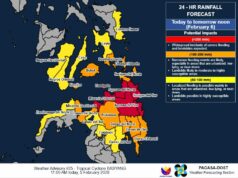COMELEC open to various options for election automation
By Patrizia Paola C. Marcelo
THE Commission on Elections (COMELEC) is looking at “all options” for conducting the upcoming midterm and national elections.

COMELEC Chairman Andres D. Bautista told reporters yesterday during the Automated Election System (AES) Technology Fair, organized by the COMELEC Advisory Council (CAC), that they are considering all options to find the best technology, or mix of technologies to use for the automation for the next elections, in order to improve on the conduct of the elections.
“We are looking at all options at this point…. There are no specific kinks [that we would like be fixed from the previous elections], but what we like to do is keep improving. We have vastly improved the way we conducted our elections. We [have to] keep on getting better, especially since technology is also evolving,” Mr. Bautista told reporters.
Mr. Bautista said, however, that while they will be looking at the latest technology, they have to choose the most cost-effective system being offered.
He also said that they are open to considering adopting what Filipino companies have to offer. “If Filipinos can do it, then [why do we have to look at foreign developers]? But then again, we have to prove that the technologies will work.”
In a presentation, Mr. Bautista enumerated the improvements of the conduct of the elections from 2010 to 2016, sharing that the Philippines has changed to now being one of the examples or “teachers” in election management from being one of the “students”.
Mr. Bautista also said that the options on the table for the automation of the elections are: refurbishment of the precinct count optical scan (PCOS) machines used during the previous elections; exercising its option to purchase; combination of refurbishment and purchasing; lease of new optical mark readers (or the machines that read the multiple-choice answer sheets); adopting a new technology; or a combination of all of the above.
The AES Technology Fair was organized by the CAC, led by the Department of Information and Communications Technology (DICT), to feature the latest technology available in the market, including locally developed AES technologies. Participating AES providers or developers presented, discussed and conducted demonstrations on their respective technologies.
“This fair is to help COMELEC find the most suitable technology that will ensure the sanctity of the ballot and the transparency of the elections,” DICT Secretary Rodolfo A. Salalima, who sits as Chair of the CAC, said in his remarks.
The CAC, tasked to recommend the most appropriate, secure, and cost-effective technology that will be used for the upcoming elections, will submit its recommendations to COMELEC on Monday.
The following AES developers participated in the AES Fair: Precinct Automated Tallying System (PATAS); Transparent Election System (TAPAT); Smartmatic International Corp., which was the developer partner of COMELEC for the 2010 and 2016 presidential, and 2013 midterm elections; IP Converge Data Services, Inc.; Laxton Group; DBP Data Center Inc.; and Arronet Solutions Integrator, Inc.
Among the participating developers, PATAS, TAPAT, and DBP Data Center, Inc. are local providers.
Philippine elections have been automated since the 2010 presidential elections.
These elections have not been without controversy. For the 2016 elections, some COMELEC and Smartmatic officials were indicted for alleged data tweaking in the elections. Prosecutors later cleared the officials, saying that there was not enough proof that they conspired to purposely tamper with the transparency server that allegedly compromised the elections.
With regard to the postponement of the Barangay and Sangguniang Kabataan (SK) elections, Mr. Bautista said that they are still awaiting the direction from the legislative branch whether or not the elections will push through.
“Hopefully, in the next few weeks, we can know what will happen regarding the elections,” Mr. Bautista told reporters.
He also said that the COMELEC is continuing its preparations, such as facilitating the bidding process and conducting a command conference with the Armed Forces of the Philippines (AFP) and the Philippine National Police (PNP) for the said elections even without the final instructions.
He also said that spending for preparations so far has been “very small”.
The CAC is composed of the DICT; the Department of Education (DepEd); the Department of Science and Technology (DOST); and members from the academe, information and communications technology organizations, and nongovernmental electoral reform organizations.



